Solid science backs the powerful Impact a change in diet, first as individuals and next populations, will have on our future. There is no disagreement as to the direction we must take: More plant foods. There is only a matter of degree, how far? The position taken by the McDougalls is that there is no time or room for error: The best chance to make things right is now and this is why we recommend a traditional, starch-based diet. A half century of hard work has proven the effectiveness and acceptability of recommended foods.
Change In Food Absolute Requirement

Global Food System Emissions Could Preclude Achieving the 1.5° and 2°C Climate Change Targets
The Paris Agreement’s goal of limiting the increase in global temperature to 1.5° or 2°C above preindustrial levels requires rapid reductions in greenhouse gas emissions. Although reducing emissions from fossil fuels is essential for meeting this goal, other sources of emissions may also preclude its attainment. We show that even if fossil fuel emissions were immediately halted, current trends in global food systems would prevent the achievement of the 1.5°C target and, by the end of the century, threaten the achievement of the 2°C target. Meeting the 1.5°C target requires rapid and ambitious changes to food systems as well as to all nonfood sectors. The 2°C target could be achieved with less-ambitious changes to food systems, but only if fossil fuel and other nonfood emissions are eliminated soon.
Meats to Vegetarian Resulted in a 49·6% Drop GHGE*
(*green house gas emissions)
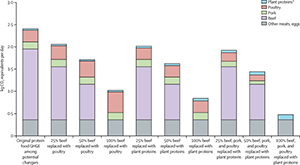
Addressing the carbon footprint, healthfulness, and costs of self-selected diets in the USA: a population-based cross-sectional study
“Replacing 100% of beef, pork, and poultry intake in the diet of these potential changers with plant-protein foods lowered mean GHGE by 49·6%. Beef, for example, has among the highest emission levels of all foods, with GHGE per kg about 10 times that of chicken, and about 20 times that of nuts, seeds, or legumes.”
Ending Animal Agriculture Would Stabilize GHGs and Offset 68 Percent of CO2 Emissions
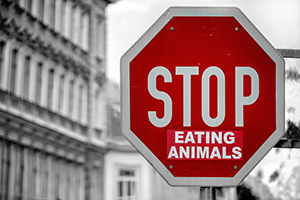
Rapid Global Phaseout of Animal Agriculture Has the Potential to Stabilize Greenhouse Gas Levels for 30 Years and Offset 68 Percent of CO2 Emissions this century
Thus, crudely, eliminating animal agriculture has the potential to reduce net emissions by the equivalent of around 1,350 Gt CO2 this century…total anthropogenic CO2 emissions since industrialization are estimated to be around 1,650 Gt. The magnitude and rapidity of these potential effects should place the reduction or elimination of animal agriculture at the forefront of strategies for averting disastrous climate change.
Replacing ruminants achieves over 90 percent of climate benefit of eliminating animal agriculture.
Maximal GHGE Reductions Achievable Ranged from 62% to 78%
NUTR-GHGE-MINI model
GHGE, in g CO2eq/day (and % variation from observed diet)
| France | UK | Italy | Finland | Sweden | |
| Women | 1590 | 1213 | 1256 | 954 | 1362 |
| (−63%) | (−64%) | (−69%) | (−75%) | (−65%) | |
| Men | 2224 | 1256 | 1623 | 1120 | 1328 |
| (−62%) | (−73%) | (−68%) | (−78%) | (−75%) |
Dietary Changes Needed to Improve Diet Sustainability: Are They Similar Across Europe?
“…a maximal GHGE decrease of 62–78% was theoretically achievable while still ensuring nutritionally adequacy…”
Our Review Showed That Reductions Above 70% of GHG Emissions
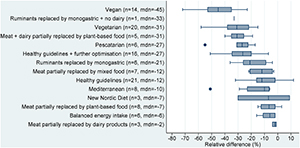
The Impacts of Dietary Change on Greenhouse Gas Emissions, Land Use, Water Use, and Health: A Systematic Review
…with reductions as high as 70–80% of GHG emissions and land use, and 50% of water use… Reductions in environmental footprints were generally proportional to the magnitude of animal-based food restriction.
Plant-based Diets Could Reduce Emissions by up to 80%

Food in the Anthropocene: the EAT-Lancet Commission on Healthy Diets from Sustainable Food Systems
“We estimated that changes in food production practices could reduce agricultural greenhouse-gas emissions in 2050 by about 10%, whereas increased consumption of plant-based diets could reduce emissions by up to 80%. A further 5% reduction could be achieved by halving food loss and waste.”
Largest Reduction Associated with Vegan of −81.4%

Climate Change Mitigation Through Dietary Change: A Systematic Review of Empirical and Modelling Studies on the Environmental Footprints and Health Effects of ‘Sustainable Diets’
“…consistently reported reductions in greenhouse gas emissions with the largest reduction associated with vegan (−81.4% [95% CI −87.7 to −75.1])”
Widescale adoption of diets with a low environ- mental impact offer an important opportunity for both climate change mitigation and health benefits through the food system.
Vegan Diet Leads 83% Reduction in GHG Emissions from Current Level
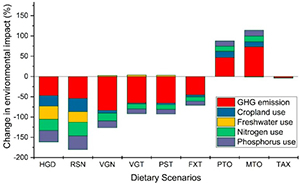
Dietary Change Scenarios and Implications for Environmental, Nutrition, Human Health and Economic Dimensions of Food Sustainability
“The changes in individual environmental footprint varied with the type of scenario. For example, while the vegan (VGN), vegetarian (VGT) and Pescatarian scenario leads to 83%, 63% and 6% in GHG emissions from current levels…a high reduction in the intake of meat and vegetable oils… increased intake of legumes, nuts, seeds, fruits and vegetables.”
Reducing…in Particular Greenhouse Gas Emissions (Reductions of up to 84%)
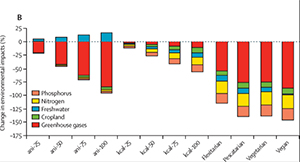
Health and Nutritional Aspects of Sustainable Diet Strategies and Their Association with Environmental Impacts: A Global Modelling Analysis with Country-level Detail
It also markedly reduced environmental impacts globally (reducing greenhouse gas emissions by 54–87%, nitrogen application by 23–25%, phosphorus application by 18–21%, cropland use by 8–11%, and freshwater use by 2–11%) and in most regions, except for some environmental domains (cropland use, freshwater use, and phosphorus application) in low-income countries.
87% Reduction In GHG
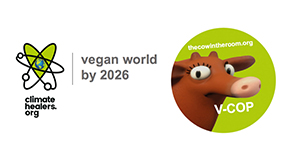
Animal Agriculture is the Leading Cause of Climate Change – A Position Paper
In this paper, we established that animal agriculture is the leading cause of climate change accounting for at least 87% of annual greenhouse gas emissions. We also illustrated the need to properly sequence the shutdown process for the killing machine (animal agriculture) and the burning machine (fossil fuel burning) so that we don’t increase the radiative forcing unnecessarily.
Vegan diet has only 25% the environmental impact (greenhouse gas emissions) as high-meat eaters.
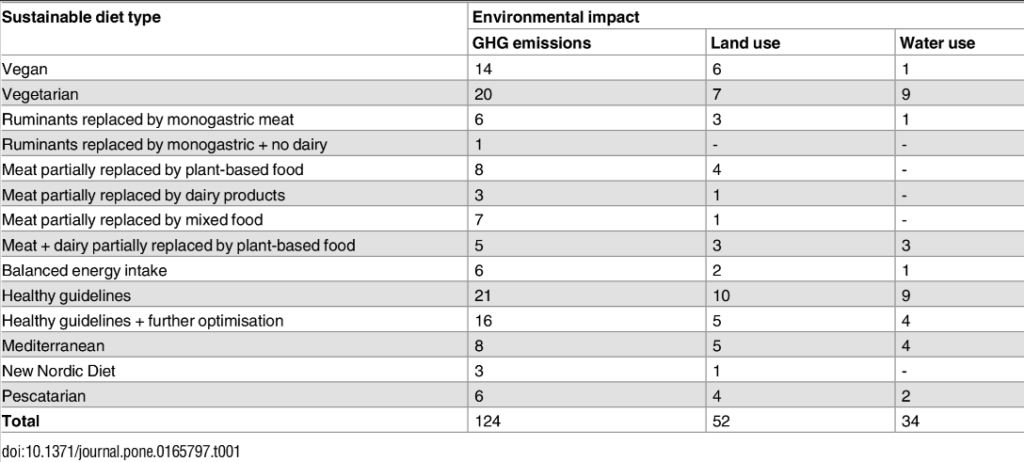
Vegans, vegetarians, fish-eaters and meat-eaters in the UK show discrepant environmental impacts
There is a strong relationship between the amount of animal-based foods in a diet and its environmental impact, including GHG emissions, land use, water use, eutrophication and biodiversity. Dietary shifts away from animal-based foods can make a substantial contribution to reduction of the UK environmental footprint. All environmental indicators showed a positive association with amounts of animal-based food consumed. Dietary impacts of vegans were 25.1% of high meat-eaters (≥100 g total meat consumed per day) for greenhouse gas emissions, 25.1% for land use, 46.4% for water use, 27.0% for eutrophication and 34.3% for biodiversity.
Photo of 1.5 degrees by Mika Baumeister on Unsplash. Photo of stop sign by Simon Berger on Unsplash. Photo of wheat by Raphael Rychetsky on Unsplash. Photo of foods in bags by Andrea Leon on Unsplash.




